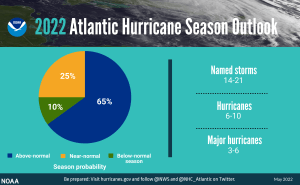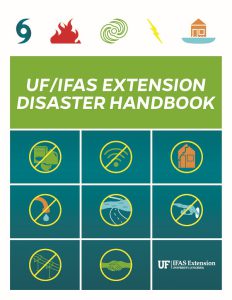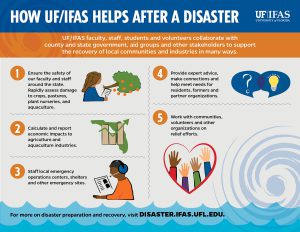The 2022 Atlantic Hurricane Season begins June 1. Are you ready?
Maybe you think you’re ready—you’ve got some bottled water and canned goods to last a few days. Maybe you plan to get those things, just as soon as you hear the next hurricane will really make landfall near you.
But if you’ve been in a grocery store lately, you know that due to supply-chain issues, you can’t always rely on needed items being there. If you can’t find things like baby formula now, what’s it going to be like when the storm front is a day away?

You and your family’s immediate safety is the most important thing to take care of. But beyond that, what about the trees around your house—can they withstand high winds and heavy rainfall? Or your pets or livestock—do you know where they can shelter if you have to leave your home? Do you have important documents in a safe place—insurance, titles, birth certificates? Do you have photos of your property you can show to claim adjusters? Do you know what to do and who to call after the storm?
It’s a lot to think about, especially with a hurricane bearing down on you. To avoid panic and act effectively, it’s good to have all your questions answered well before the “cone of uncertainty” is aimed at you.
Fortunately, there’s a lot of information out there to help you prepare for hurricanes and other emergencies. UF/IFAS Extension has compiled a collection of resources covering virtually every aspect of disaster preparation and recovery. It’s a good idea to review these early and often during the next six months.
The UF/IFAS Extension Disaster Handbook
You can start by downloading this handy one-stop resource: The Disaster Handbook (https://bit.ly/3sR3OaW) is a bilingual (English and Spanish) guide to the most essential information for dealing with severe weather emergencies. Brief, to-the-point fact sheets advise on keeping food and water supplies safe; how to prepare your home and landscape, nursery, or farm for high winds and flooding; how to safely clear debris after the storm; and how to apply for assistance. It also includes important information about maintaining your mental health and caring for others in emergencies.
UF/IFAS Disaster Preparation and Recovery
The Disaster Handbook is housed on our Disaster Preparation and Recovery website (https://disaster.ifas.ufl.edu), which has even more useful information for homeowners, businesses, nurseries, marinas, ranches, farms, and communities. The website is updated frequently, and new hurricane-related blogs are posted almost daily. It’s a good place to stay up on the latest hurricane information.
Florida EDEN
The Florida Extension Disaster Education Network (EDEN) (https://piecenter.com/resources/fl-eden/) is another great place to go for information. Florida EDEN is part of a nationwide effort of state Cooperative Extension Services to reduce the impact of disasters through research-based information.
This year, Florida EDEN has a new series of videos and fact sheets for special topics related to hurricane preparedness, including equine safety for horses, small and large animals, apiaries, and food safety. They also have a handy disaster supply checklist and a tool for contacting family and loved ones after emergencies.
One of the most important jobs Florida EDEN’s taken on is mental health training for disasters. Emergency situations can be enormously stressful and devastating, both for those affected and the first responders who rush to their aid. UF/IFAS family, youth, and community sciences (FYCS) faculty members Angie Lindsey (Florida EDEN Point of Contact) and Heidi Radunovich have developed a free online training course on Disaster Mental Health. The self-paced, 2 ½ hour course covers Disaster Stress and Mental Health, Community Recovery After Disasters, Coping and Providing Support after Disasters, and Disaster Stress and Mental Health Resources.
You can subscribe to the EDEN newsletter to get current information and updates as the situation changes: https://bit.ly/fledennews.
Information First Responders
I like to think of Extension faculty as information first-responders—we’re boots on the ground who go into situations where there is an immediate need for vital, research-based information. This is especially true in the case of natural disasters. During times of emergency, many Extension agents serve on their county’s Emergency Operations Centers (EOCs), doing 12+ hour shifts tracking storm conditions and answering needs for help. We’re also representatives of the Florida State Agricultural Response Team (SART), helping to monitor the water quality in wells and rounding up livestock that have strayed over ruined fencing. After the storm has cleared, many agents help assess the damage to communities, farms, and ranchlands so that those affected can get assistance and apply for emergency aid.
Here at UF/IFAS Extension, we prepare for disasters all year round, and when hurricane season gets here, we are on full alert. We urge you to be prepared too, and to remember that if you need help in an emergency, we are there for you.
 0
0



